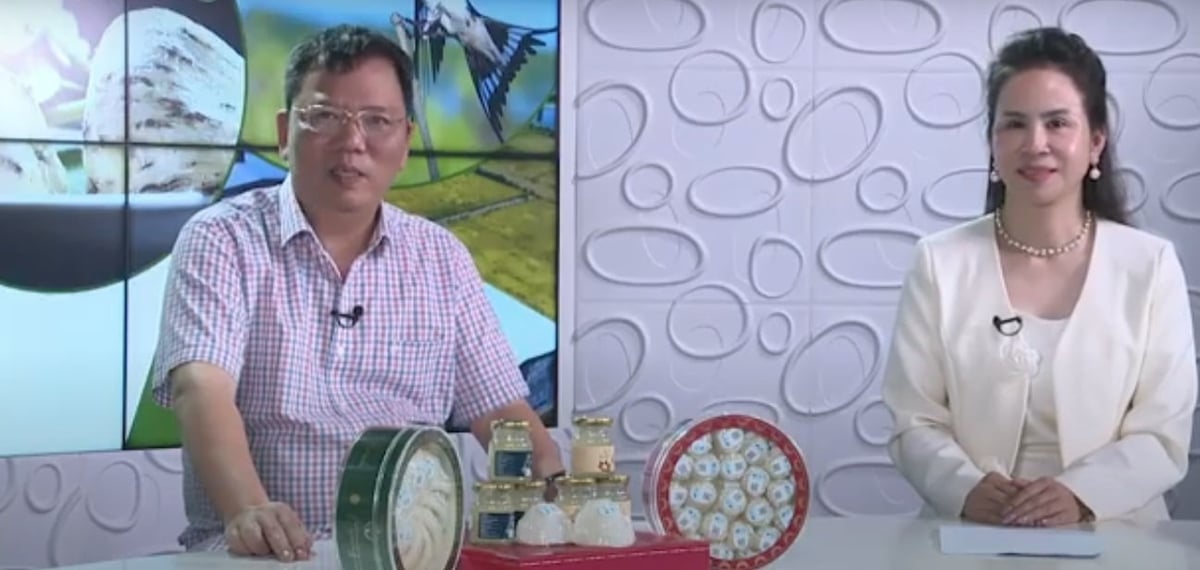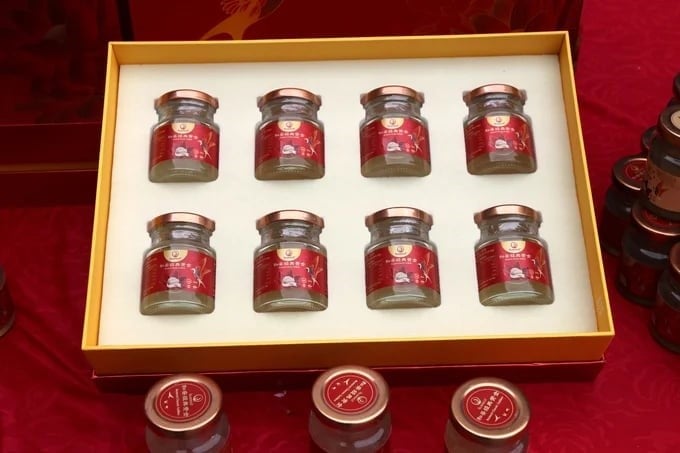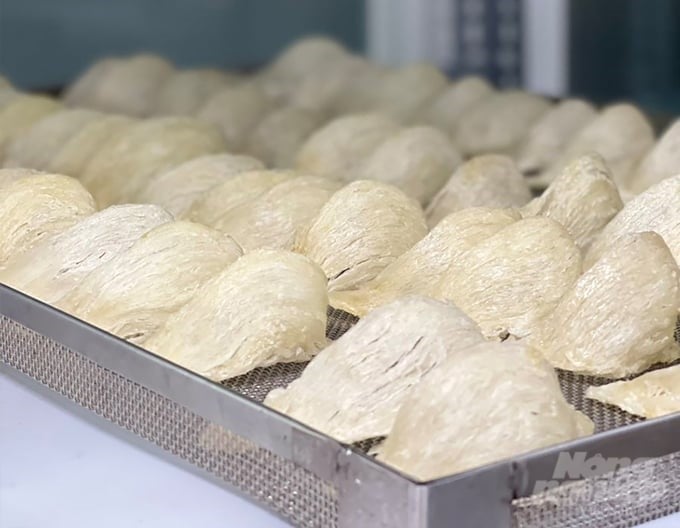November 18, 2025 | 23:39 GMT +7
November 18, 2025 | 23:39 GMT +7
Hotline: 0913.378.918
November 18, 2025 | 23:39 GMT +7
Hotline: 0913.378.918
Vietnam holds favorable conditions for bird's nest exports to China, including a long-standing trade relationship and strong consumer demand in a market of over one billion people. However, for Vietnamese bird's nest products to penetrate deeply and sustainably into this market, it requires not only product quality but also strict compliance with the regulations on quarantine, traceability, and food safety as mandated by the General Administration of Customs of China (GACC).

Ms. Nguyen Thi Thu Ha (right), General Director of Avanest Vietnam Nutrition Joint Stock Company. Photo: VAN.
As a pioneering enterprise in exporting bird's nests to the Chinese market, Avanest Vietnam Nutrition Joint Stock Company (Avanest) has always prioritized food safety across its entire production chain since its establishment. From the outset, the company built and operated its factory according to GMP standards issued by the Ministry of Health.
Sharing with Vietnam Agriculture and Nature Newspaper, Ms. Nguyen Thi Thu Ha, General Director of Avanest, emphasized, “Since Avanest was established, we have implemented a GMP-standardized process to develop a food safety management system, beginning from raw material areas.
All swiftlet houses that supply raw materials to Avanest are registered with the Department of Livestock Production and Animal Health and undergo strict disease surveillance, especially for avian influenza and Newcastle disease, which are mandatory checks under Chinese regulations. Every stage in the production chain, from harvesting to transportation, is closely monitored to ensure traceability.”
Avanest's practical experience showed that two fundamental prerequisites for entering the Chinese market are traceability and veterinary quarantine. However, according to Mr. Ngo Xuan Nam, Deputy Director of the Vietnam SPS Office, three key areas demand attention.
First, food safety must be controlled right from the raw material areas. Disease surveillance is crucial for bird nests, particularly avian influenza and Newcastle disease. From harvesting to processing and export, food safety procedures must be strictly followed. Enterprises must strictly follow the food safety protocols required by their certification systems, whether HACCP or GMP. “Only by doing so can we ensure that products, from raw material areas to packaging and export, meet food safety standards,” affirmed Mr. Nam.

Avanest bird's nest products meet regulations on food safety and disease surveillance. Photo: Duc Trung.
Second, transparent documentation is essential to support traceability. Enterprises must only source from swiftlet houses with approved identification codes and under official supervision. Full records must accompany the entire process to meet the requirements of the bilateral protocol with China.
Third, disease surveillance must be proactive. “We need to carry out our own product sampling and quality testing to guarantee both food and disease safety. With transparent documentation and rigorous compliance, I believe we can confidently meet any market requirement,” Mr. Nam stated.
Since Avanest began exporting bird's nest products to China, the company has noticed distinct features of the Chinese market. “China is one of the world's largest bird's nest importers and imposes strict quality standards. Fortunately, Chinese consumers have responded positively to Vietnamese products. They appreciate the fragrant aroma and chewy texture of our bird's nests,” Ms. Ha shared.
However, challenges remain. “Despite quality recognition, Vietnamese bird's nest exports are still modest in volume. The number of Vietnamese processing facilities approved for export is limited, and that restricts broader market penetration,” she added.
The competition in China is intense, particularly regarding price. Chinese consumers are still unfamiliar with Vietnamese products compared to those from other countries. This calls for stronger branding and promotional efforts, not only from enterprises like Avanest but also with active support from governmental agencies.

Vietnamese bird's nest exports are still modest in volume. Photo: Nguyen Thuy.
According to the representative of the Vietnam SPS Office, the barriers facing the bird's nest industry reflect challenges across Vietnam's agricultural export sector. Vietnam has joined 17 free trade agreements (FTAs), many of which have slashed tariffs to zero. So, the real challenge now is meeting non-tariff requirements like food and disease safety under SPS measures.
A deeper, structural issue, he pointed out, lies in traditional production habits. “We must move from an agricultural production mindset to an agricultural economy mindset, which means producing what the market demands, not just what we have.
In addition, Vietnam's bird's nests possess unique regional traits shaped by environmental factors such as soil, water, and climate. Yet, the country has not fully leveraged these distinctive values. “Even within Vietnam, nests from Nha Trang differ from those in the Central Highlands or the Mekong Delta due to natural food sources. But we have not maximized this diversity,” Mr. Nam explained.
Another barrier is weak inter-enterprise linkage. “If only a handful of companies export, the industry cannot scale. We need more businesses to join forces, as we have seen in the coffee or cashew sectors,” he said.
To address this obstacle, Mr. Nam called on industry associations, such as the Vietnam Bird's Nest Association and local Bird's Nest Associations, to play a stronger coordinating role. Enterprises already licensed for exports to China should lead the way in mentoring and guiding others. “Even when we can meet standards for food safety, disease control, and quality, we struggle to reach international markets, including China, without the companionship of companies and associations,” he added.
Under the decisive leadership of Minister of Agriculture and Nature Do Duc Duy and the leaders of specialized departments, the Vietnam SPS Office is coordinating to advise the Ministry on policies and solutions to boost production, help enterprises ensure food and disease safety, enhance product value, and accelerate agricultural exports, thereby bringing greater benefits to farmers.
Translated by Thu Huyen

(VAN) 'If we can address disease challenges and properly plan farming zones, Vietnamese shrimp can absolutely rise to lead the world,' Mr. Le Van Quang affirmed.

(VAN) The year 2025 continues to mark a significant footprint for Chanh Thu Fruit Import-Export Group Joint Stock Company (Chanh Thu Group) in the international market.

(VAN) Participating in the exhibition celebrating the 80-year tradition of the Agriculture and Environment sector, Dong Giao Food Export Joint Stock Company (DOVECO) showcased a range of products utilizing new technologies.

(VAN) Vietnam’s pepper export turnover in the first 10 months of 2025 reached $1.39 billion, already surpassing the full-year figure of 2024.

(VAN) AGRITECHNICA 2025 has impressively reaffirmed its position as the world’s leading trade fair for agricultural machinery.
/2025/11/17/4947-2-104601_225.jpg)
(VAN) The international market is growing rapidly, creating major opportunities for Viet Nam's tilapia industry.
/2025/11/17/1234-2-010716_981.jpg)
(VAN) Deputy General Director of Viet Nhat Group Nguyen Dang Ngoc shared experiences on building linkage chains and developing sustainable tilapia farming that meets international standards.